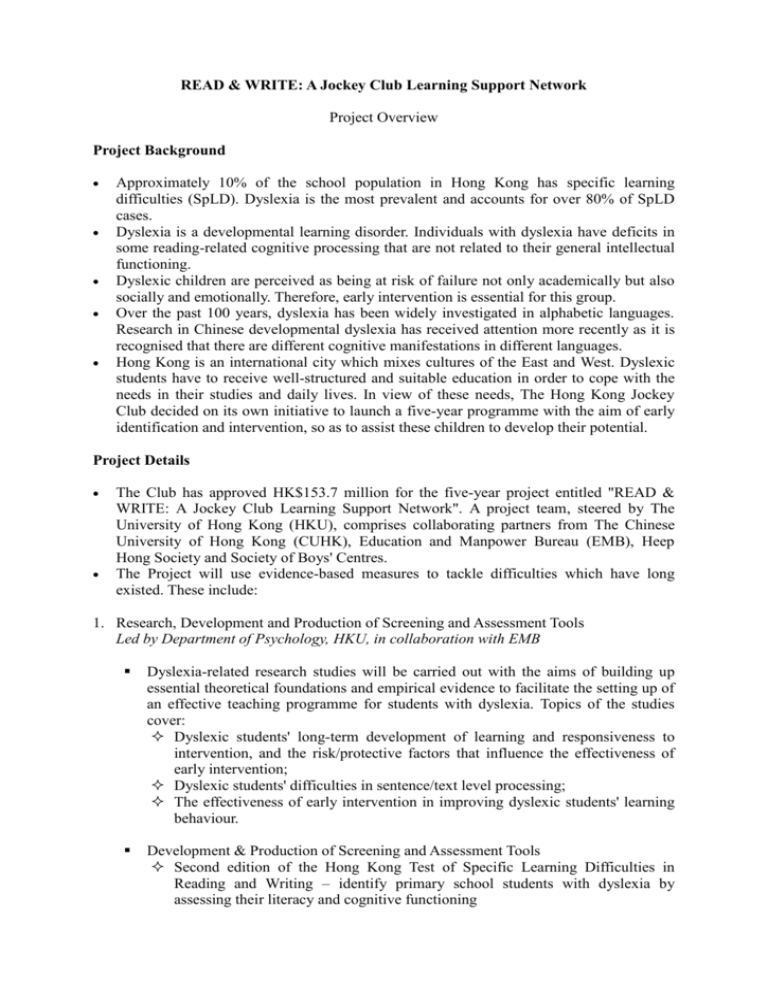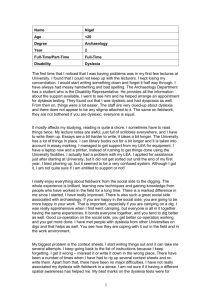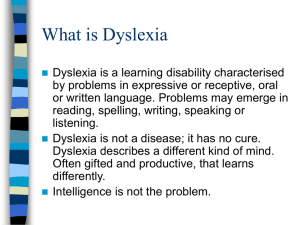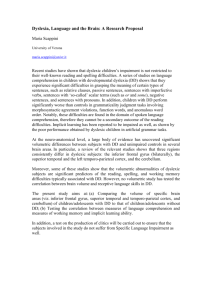For further information of the project, please see Fact Sheet attached
advertisement

READ & WRITE: A Jockey Club Learning Support Network Project Overview Project Background Approximately 10% of the school population in Hong Kong has specific learning difficulties (SpLD). Dyslexia is the most prevalent and accounts for over 80% of SpLD cases. Dyslexia is a developmental learning disorder. Individuals with dyslexia have deficits in some reading-related cognitive processing that are not related to their general intellectual functioning. Dyslexic children are perceived as being at risk of failure not only academically but also socially and emotionally. Therefore, early intervention is essential for this group. Over the past 100 years, dyslexia has been widely investigated in alphabetic languages. Research in Chinese developmental dyslexia has received attention more recently as it is recognised that there are different cognitive manifestations in different languages. Hong Kong is an international city which mixes cultures of the East and West. Dyslexic students have to receive well-structured and suitable education in order to cope with the needs in their studies and daily lives. In view of these needs, The Hong Kong Jockey Club decided on its own initiative to launch a five-year programme with the aim of early identification and intervention, so as to assist these children to develop their potential. Project Details The Club has approved HK$153.7 million for the five-year project entitled "READ & WRITE: A Jockey Club Learning Support Network". A project team, steered by The University of Hong Kong (HKU), comprises collaborating partners from The Chinese University of Hong Kong (CUHK), Education and Manpower Bureau (EMB), Heep Hong Society and Society of Boys' Centres. The Project will use evidence-based measures to tackle difficulties which have long existed. These include: 1. Research, Development and Production of Screening and Assessment Tools Led by Department of Psychology, HKU, in collaboration with EMB Dyslexia-related research studies will be carried out with the aims of building up essential theoretical foundations and empirical evidence to facilitate the setting up of an effective teaching programme for students with dyslexia. Topics of the studies cover: Dyslexic students' long-term development of learning and responsiveness to intervention, and the risk/protective factors that influence the effectiveness of early intervention; Dyslexic students' difficulties in sentence/text level processing; The effectiveness of early intervention in improving dyslexic students' learning behaviour. Development & Production of Screening and Assessment Tools Second edition of the Hong Kong Test of Specific Learning Difficulties in Reading and Writing – identify primary school students with dyslexia by assessing their literacy and cognitive functioning Production of a professional assessment battery for identification of secondary school students with dyslexia - identify junior secondary school students with dyslexia by assessing their literacy and cognitive functioning Second edition of The Hong Kong Specific Learning Difficulties Behaviour Checklist for primary school students – assist primary school teachers to identify students with dyslexic features according to their learning behaviour Second edition of the computerised training kit "Training in Chinese Word Reading Skills" for dyslexic students – enhance students' ability in Chinese character recognition Development of The Hong Kong Specific Learning Difficulties Behaviour Checklist for secondary school students for teachers' use – assist secondary school teachers to identify students with dyslexic features at an early stage Development of a computerised teacher assessment tool for primary school students – assist primary school teachers to identify students with dyslexic features 2. Development of a school-based support model for primary schools Led by Department of Psychology, HKU Tiered Intervention Model for supporting dyslexic primary school students will be developed and validated in local schools. The first phase commenced in September 2006 with three primary schools participating in a trial-run of a 3-year Tiered Intervention Model. In the second phase, four primary schools will be invited to participate. It is hoped that the Tiered Intervention Model will be able to improve students' listening, speaking, reading and writing abilities, and offer them full support. It is expected that the Model will ultimately be introduced to all primary schools in Hong Kong. 3. Teacher Development Led by Department of Education, CUHK and the Society of Boys' Centres The 5-year teacher development project has the following components: Provide school-based training for teachers of participating schools, in collaboration with the school-based support team of HKU; Organise workshops for EMB staff members; Provide teacher development training for Chinese language teachers in primary schools. Teacher development training for primary schools is the core of the programme. The teacher development team of CUHK will develop a two-part, 30-hour teacher development course. Part one will focus on enhancing the understanding of the psychological development of children in learning languages. This will enable teachers to improve their teaching skills and acquire the basic knowledge of how to identify students with specific learning difficulties. In part two, teachers will learn how to teach dyslexic students at an advanced level. They will be taught how to assist the students with small group remedial learning and individualised education programme. Teachers will also learn the way to handle emotional and family problems caused by dyslexic children, and strategies to develop a school-based support programme. Training will commence in September 2006. Over 5,000 teachers will be trained in this five-year project. It is expected that at least six to eight Chinese language teachers in every school will receive training under the project. 2 4. Development of district-based support model and learning kits for pre-school and primary school students at risk Led by Heep Hong Society Develop early intervention services for pre-school children at risk Research results indicate that early intervention can minimise learning difficulties that students might encounter in their studies. The educational psychologists, speech pathologists, occupational therapists and social workers of Heep Hong Society will work together to develop a series of systematic learning activities to enhance students' language, writing and reading abilities. Training courses for parents will be developed so as to empower their technique in assisting dyslexic students. A teaching kit will be developed with reference to the result of this training programme, and shared with parents and pre-school education workers. Develop district-based support services for dyslexic students To facilitate the wholesome development of dyslexic students and provide support for their family members, the programme will develop an all-round district-based support network for dyslexic students and their families, including parent-counselling services. Studies will be conducted to explore their actual needs, analyse the existing services provided by different service units, and recommend ways to co-ordinate services at district level. Their experience will be shared with frontline workers from other agencies so as to assist all dyslexic students in Hong Kong. 5. Development of secondary school Chinese language learning kit with IT support system for teachers and parents. Led by Society of Boys' Centres The "Learning Development Project" of the Society of Boys' Centres, led by educational psychologists, teachers and social workers, will develop a learning kit for junior secondary school students with dyslexia who are studying in mainstream schools. The kit will help to improve students' reading and writing skills. A set of supplementary teaching materials for Secondary 1 to Secondary 3 students with dyslexia will be developed in 2006 – the first year in which the project commences. A trial run in mainstream schools will follow in the next three years. The Society of Boys' Centres will develop an IT support system in 2008 to enhance dyslexic students' learning motivation. 6. Public education to enhance public awareness and understanding of dyslexia. 7. Overseas experts will be invited to be consultants of the project. These consultants will help to host seminars and workshops, and assist in evaluating the effectiveness of the project. 27 September 2006 3







